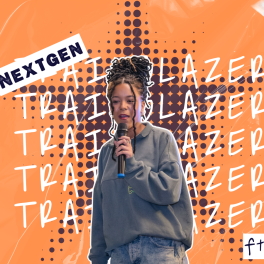
Please note: this article includes sensitive topics that some people might find difficult. Please visit our Resources Page for help
I first experienced anxiety when I was around 14. If anyone knows what it is like to be at private school, when you don’t fit the typical mould, you’ll understand the pressure when you’re faced with a room of straight A* students and the weight of expectation.
I worked hard, but was rarely rewarded with the grades. Being in that environment, I found it really unsettling constantly being compared. It made me want to scream, when teachers couldn’t see how much effort I was putting in behind the scenes; just because you don’t get the top grade, you’re either dumb or lazy.
From my childhood up to the present day, my coping mechanism was always sport. I loved training, which gave me purpose and focus, and I thrived off competition. The adrenaline rush was addictive and I welcomed the challenges it brought to improve.
When I picked up my first big injury, with the pressure of GCSEs looming, suddenly I was faced with my biggest fear; that I wasn’t good enough.
Over the next few years and many attempts to get back into athletics, I started on this emotional rollercoaster of understanding my triggers and dealing with the endless mental struggle.
The seemingly constant flow of injuries really took its toll and I got so frustrated that my body wouldn’t do what my head and my heart wanted it to that it started to affect my ability to perform under pressure.
I’m the type of person who wears their heart on their sleeve and with an awful guilty conscience, the thought of letting everyone down consumed my thoughts and fuelled my anxiety, so I made the decision to hang up my spikes.
The panic attacks became overwhelming to the point of passing out. I felt so lost after losing a big part of my life, but it was the best thing for me to get myself back on track. Investing my time in another sport and learning to have fun with it again helped bring back my love for sport by taking the pressure off.
When uni came around, in the beginning, I gained so much confidence and met some incredible people, who to my surprise could relate somewhat to my mental health battle.
However, the past year has been so tough with a combination of family, financial concerns and a failed relationship causing my mental health to spiral out of control.
Looking back, my relationship was a big factor. I didn’t understand why this person treated me the way he did, feeling as though it was my fault and that I deserved it, that somehow, I was the problem – but I know now that’s not true.
Moving forward, I still hold some of the scars in my heart and truthfully, I’m not sure these insecurities will ever leave me. I’m so over-cautious now, I am terrified of being hurt again.
I was so ill mentally at the time, developing depression on top of the anxiety and with panic attacks and breakdowns becoming daily occurrences. I was also physically unwell and became a different person entirely.
The way I thought about myself was unhealthy: I questioned my worth and struggled to make lectures and write assignments, many of which I failed and left me on the brink of dropping out.
Truthfully, I’m still picking up the pieces from this and my future there is uncertain. My parents didn’t understand, wanted to help, but didn’t know how. At this point I didn’t want to be there; I didn’t want to be anywhere. All I wanted was for the pain to go away. The silence of night became torturous – I was overthinking everything and the insomnia was draining. It became a vicious circle I seemingly couldn’t escape.
For me, speaking to a therapist or a councillor didn’t work. I felt judged and spoken down to, which in an environment that is supposed to be a “safe space” didn’t feel particularly welcoming for someone who struggles to open up at all.
Being around people that I trusted and being able to talk openly was incredibly important to me, but also writing worries down so that I could begin to recognise the triggers. Since exercise has always been my happy place, I tried to incorporate this into my day as much as possible and get back into running to regain the strength I’d lost.
It took time, but I can finally say I’m back to being myself – but happier and more confident. I couldn’t have done this without my friends, I owe them my life, literally. My bar jobs also helped massively, allowing me to be myself, talking to anyone without being afraid of being judged.
There are always going to be good and bad days, but having the right support system in place can make all the difference.
More for you
Support Young Creators Like This One!
VoiceBox is a platform built to help young creators thrive. We believe that sharing thoughtful, high-quality content deserves pay even if your audience isn’t 100,000 strong.
But here's the thing: while you enjoy free content, our young contributors from all over the world are fairly compensated for their work. To keep this up, we need your help.
Will you join our community of supporters?
Your donation, no matter the size, makes a real difference. It allows us to:
- Compensate young creators for their work
- Maintain a safe, ad-free environment
- Continue providing high-quality, free content, including research reports and insights into youth issues
- Highlight youth voices and unique perspectives from cultures around the world
Your generosity fuels our mission! By supporting VoiceBox, you are directly supporting young people and showing that you value what they have to say.





